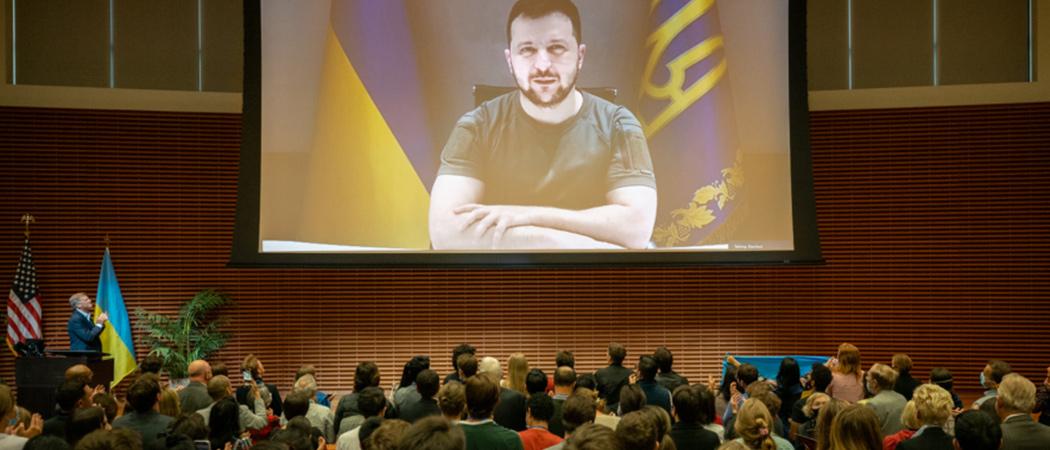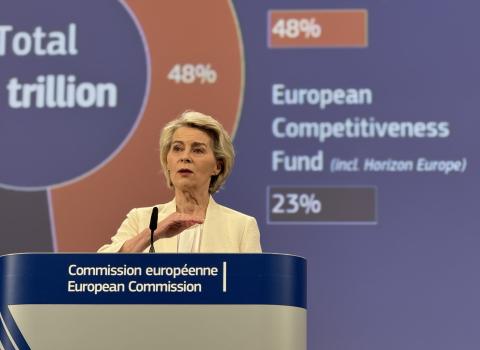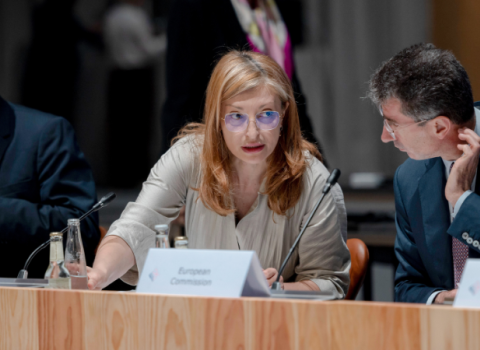The majority of scientists chose to stay in the country, but bombed out labs and lack of water and electricity means 73% cannot continue their research

President Volodymyr Zelenskyy of Ukraine talks to an audience at Stanford University via a live video broadcast. Photo: Andrew Brodhead, Stanford University
While the EU scrambles to help researchers at risk fleeing Russia’s war, Ukrainians are urging decision makers to turn their eyes to the situation in the country and start thinking about long-term support.
According to a new survey of more than 2,000 Ukrainian scientists, 38% have been forced to relocate internally since the beginning of the war, while 15% have fled abroad. Almost three quarters of Ukrainian scientists are struggling to carry on with their work as Russia wages war on their country.
For some, there are physical hurdles, such as getting access to laboratories and working spaces, or lack of electricity and water. For others, constant fear and inability to concentrate on work in the face of war is the determining factor.
Yulia Bezvershenko, visiting scholar at the Ukrainian emerging leaders programme at Stanford University, says the situation in her country is different from the world’s recent experiences helping scholars at risk. Last year, many scientists fled Afghanistan following the Taliban takeover of the government. But in the face of Russia’s war in Ukraine, most researchers remain in the country. Some are not allowed to leave due to martial law. Others choose to stay for personal, legal and professional reasons.
“It’s very important to help Ukrainians researchers who are outside the country, but we understand that it’s also very important to find, to build, to implement instruments which can help Ukrainian researchers to remain within their profession within Ukraine,” says Bezvershenko.
Bezvershenko is participating in the National Council on Rebuilding Ukraine, advising the council on the needs of the science community. She says the country will need new support measures to repair things after the war but securing long-term aid for the recovery of science won’t come easy. In times of crisis, there is willingness to reach for ‘easy’ solutions, such as top-up grants or mobility schemes. “But we understand that this case needs some new instruments, which can useful both today and the next days after the war,” says Bezvershenko.
Her job is to persuade everyone who listens that a strong independent state of Ukraine is only possible if it is based on a knowledge economy and society, a notion she says must be underlined as the country recovers from the invasion.
Communicating needs
Bezvershenko was speaking at an event held to present the findings of a survey 2,173 Ukrainian scientists on the impact of the war. Little has been known in concrete terms about the situation facing Ukraine’s science community, and the results of the UAScience.Reload survey conducted in April, give fresh insight into the situation on the ground.
There are some encouraging signs. At least half the scientists are currently living in places where they experience no hostilities due to the war and only 7% are in areas of active combat.
Despite the disruption, around 81% of scientists are continuing to receive a salary from the institution they work at. “[That] means that the system we have […] is pretty resilient when facing such shocks and turbulences as war,” says Anastasiia Lutsenko, project lead at Kyiv Academic University, presenting the findings of the survey.
And the scientific community is ready to put its weight behind Ukraine’s reconstruction, with 74% saying they are willing to participate in strengthening the country’s defence capabilities and rebuilding.
The international community will also have a role to play in helping rebuild and modernise Ukraine’s science ecosystem. Yuriy Khalavka, coordinator of the UA Science.Reload project, says one way organisations abroad could start helping out today is by offering remote grants to scientists staying in Ukraine, a plea that has been echoed by many activists.
Thus far, most institutions have generously offered fellowships for refugee scientists, but few have been made available to those based in Ukraine. Yet, the majority of scientists appears to have stayed in the country. Of the 15% of 2,173 survey respondents who fled abroad, 27% went to Germany and 25% to Poland.
“We need to understand that this could actually be more efficient if we spend money this way,” says Khalavka. “More people could be covered with this support.”
As the war continues, one of scientists’ main jobs remains communicating their needs, including the type of support they hope to receive from the international community.
Olga Polotska, executive director of the National Research Foundation of Ukraine, rounded off the talk with a reminder that as Russia wages war destroying her country’s science and education ecosystem, it remains clear that science is political.
“In this war, the enemy is deliberately trying to destroy not only the infrastructure, not only the military objects of Ukraine, but also our scientific and educational facilities, which once again proves that science cannot be considered apolitical,” said Polotska. “The enemy is trying to deprive us from our rights of self-determination, our right of conducting research, the right of educating students.”





 A unique international forum for public research organisations and companies to connect their external engagement with strategic interests around their R&D system.
A unique international forum for public research organisations and companies to connect their external engagement with strategic interests around their R&D system.